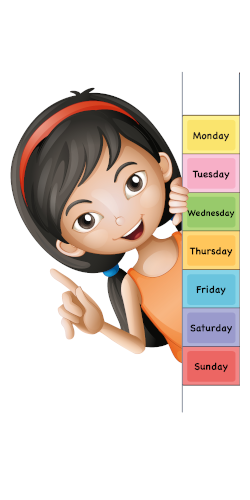
Introductions, greetings and farewells - "Introducciones, saludos y despedidas"
Los saludos en inglés dependen de las situaciones en las que nos encontremos. Hay saludos formales e informales. Demos un vistazo a algunas expresiones comunes para saludar y despedirse en inglés.
FORMALES: Formal/Polite
| 🔊 | Hello. | Hola |
| 🔊 | How are you? | ¿Cómo estás? |
| 🔊 | Good morning. | Buenos días |
| 🔊 | Good afternoon. | Buenas tardes |
| 🔊 | Good evening. | Buenas noches |
| 🔊 | Good night. | Usamos “good night” cuando nuestro día haya finalizado e iremos a dormir. |
Informales: Informal
| 🔊 | Hi. | Hola |
| 🔊 | Hey. | Hola |
| 🔊 | What's new. | ¿Qué hay de nuevo? |
| 🔊 | How's it going? | ¿Cómo le va? |
Actividad
Pregunta 1. ¿Which greeting is more suitable to use in the morning? (¿Qué saludo es más adecuado para usar por la mañana?)
Pregunta 2. ¿What's a polite way to say goodbye? (¿Cuál es una forma educada de despedirse?)
Pregunta 3. ¿What is the right way to say thanks in English? (¿Cuál es la forma correcta de agradecer en inglés?)
Pregunta 4. ¿What's a polite way to apologize? (¿Cuál es una forma educada de disculparse?)
Pregunta 5. ¿What is the correct sequence of days of the week? (¿Cuál es la secuencia correcta de los días de la semana?)
| Describing schedules and routines - Describir horarios y rutinas |
You need to use adverbs of frequency, hours, and days of the week to describe schedules and routines.
Vocabulary
| Days of the week | |
|---|---|
| 🔊 | Monday(lunes) |
| 🔊 | Tuesday(martes) |
| 🔊 | Wednesday(miércoles) |
| 🔊 | Thursday(jueves) |
| 🔊 | Friday(viernes) |
| 🔊 | Saturday(sábado) |
| 🔊 | Sunday(domingo) |
| Adverbs | |
|---|---|
| 🔊 | Always(She always arrives on time.) |
| 🔊 | Usually(We usually have dinner at 7 p.m.) |
| 🔊 | Often(They often go for a walk in the park.) |
| 🔊 | Sometimes(He sometimes forgets his keys.) |
| 🔊 | Occasionally(We occasionally visit our grandparents.) |
| 🔊 | Rarely(She rarely eats fast food.) |
| 🔊 | Seldom(He seldom watches TV.) |
| 🔊 | Never(They never miss their morning jog.) |
| Hours | |
|---|---|
| 🔊 | Morning(I wake up at 6 a.m. in the morning.) |
| 🔊 | Afternoon(We have a meeting scheduled for 2 p.m. in the afternoon.) |
| 🔊 | Evening(They usually have dinner together in the evening.) |
| 🔊 | Night(He works the night shift at the hospital.) |
| 🔊 | Midnight(The party ended at midnight.) |
| 🔊 | Early(She goes to the gym early in the morning.) |
| 🔊 | Late(They arrived home late last night.) |
| 🔊 | Around(The movie starts around 7:30 p.m.) |
Actividad
Lee el siguiente párrafo que describe horarios y rutinas.
"I have a daily schedule and follow certain routines to stay organized. In the morning, I wake up early and get ready for the day. I brush my teeth, wash my face, and have a quick breakfast. Then, I go to work or school. I have lunch around noon, and in the afternoon, I continue with my tasks. After finishing my responsibilities, I like to take a short break to relax and recharge. In the evening, I have dinner with my family and spend quality time together. Before going to bed, I brush my teeth again and read a book for a while. Then, I go to sleep to get enough rest for the next day. This is my usual schedule and routine, and it helps me stay organized and productive."
Mark true or false. Marque verdadero o falso.
1. The person wakes up late in the morning.
2. The person brushes their teeth only once a day.
3. The person has breakfast before going to work or school.
4. The person takes a long break in the afternoon.
5. The person has dinner alone.
6. The person reads a book before going to bed.
7. The person follows the same routine every day.
Speaking Task
Graba un audio y corrige las oraciones falsas. Por ejemplo: 1. The person wakes up early in the morning.
https://www.narakeet.com/app/text-to-audio/?projectId=15e52dcc-a507-4e43-a479-150ba3cc6151
Use of "can" in affirmative and interrogative sentences - Uso de "can" en oraciones afirmativas e interrogativas
Ejemplo.
| 🔊 | I can dance, they can run, she can cook. |
Utilizamos can en oraciones interrogativas antes del sujeto, veamos.
| 🔊 | Can you swim?(¿Sabes nadar?) Yes, I can - No, I can't |
| 🔊 | Can she speak French?(¿Sabe hablar francés?) Yes, I can - No, I can't |
| 🔊 | Can we go to the park?(¿Podemos ir al parque?) Yes, I can - No, I can't |
| 🔊 | Can they play the guitar?(¿Saben tocar la guitarra?) Yes, I can - No, I can't |
Actividad
Escucha atentamente la conversación entre Carlos y Laura, identifica el uso de Greetings and Farewells
Según la conversación entre Carlos y Laura, responde completa
1. What greeting did Person A use to start the conversation?
2. How did Person B respond to the greeting from Person A?
3. What does Person B do in the afternoon according to the conversation?
4. What does Person A mention about their routine?
5. How do Person A and Person B bid farewell at the end of the conversation?
